
China and Sweden: Treasured Memories
EXHIBITION | 1-29 Gotheborg | 30 Ru | 31-56 Blue and White | 57-61 Faiance | 62-150 Export | 64-147 Armorial | 151-152 Yixing
Second Section
Chinese Porcelain in Swedish Collections

30. Brush washer, Ru ware
Hebei Baofeng Xian, Northern Song (960-1127)
H. 3.5 cm, Md 13 cm, Fd 9 cm
Collection of Röhsska Museum, Gothenburg, inv.
Stoneware (ci) with ash gray rather well fused body, covered by a transparent, blue green glaze (fenqing), intentionally crackled glaze fired in reducing atmosphere. The dish is completely covered by glaze except on the three symmetrically placed spur marks.

31. Blue and White Dish
Wanli period, Ming dynasty
Md 20 cm, H 4 cm, Fd 11.5 cm
(Coll.: AW)
With flared rim, it is decorated with under glaze cobalt blue. There is a duck beside a lotus-pond, in a star shaped medallion surrounded by diaper patterns, stylized fruit-sprays and auspicious objects with ribbons, in pointed panels, around the sides. The exterior is decorated with emblems in panels and there is kiln grit inside the foot-rim.
This kind of blue and white porcelain is traditionally called 'kraak' after a captured Portuguese ship, which was taken to Amsterdam in 1602 where the cargo, partly porcelain was sold and later, copied in the Delft faience factories.

32.Blue and White Charger With Landscape Pattern
Qianlong period, Qing dynasty c.1750
Md 54 cm, H 8.4 cm, Fd 32.3 cm
(Coll.: AW)
It was painted with under glaze cobalt blue. The rim is decorated with spirals and two frames with lotus and parasols, two with plum and fans. In the center is a scene with wall, pagoda, houses, flowers and trees surrounding a lake.

33.Blue and White Dish With Flower Pattern
Kangxi period, Qing dynasty c. 1710
Md 24.2 cm, H 2.8 cm, Fd 13.6 cm
(Coll.: AW)
These dishes are decorated with under glaze cobalt blue on the rim with lotus, plum and leaf. In the center is a flower and cliff scene; the reverse has two leafy sprigs; inside the foot rings are illegible cobalt blue 'shop marks'.
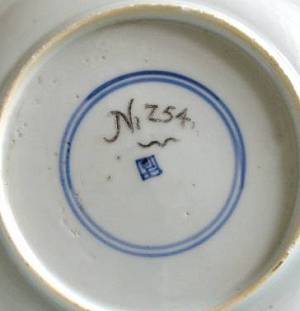
From the Dresden Collection of August, King of Poland and Elector of Saxony; there is incised mark N: 254 on one small dish from the same service.

34. Blue and White Dish With Flower Pattern
Kangxi period, Qing dynasty c.1710
Md 33 cm, H 3.7cm, Fd 18 cm
(Coll.: AW)
It is decorated with under glaze cobalt blue with lotus flowers (xi fan lian) and peonies, and a similar border on the rim dressed with iron brown.
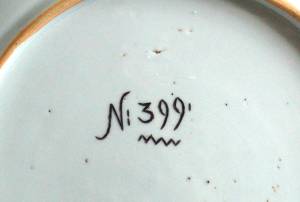
Incised inventory mark is N: 399.
From the Dresden Collection of August, The Strong, King of Poland and Elector of Saxony.

35. Blue and White Armorial Porcelain Plate
Qianlong period, Qing dynasty c. 1750
Diam. 14 and 24, height 3 cm
Collection of the City Museum of Gothenburg
Decoration: under-glaze blue; coat of arms of the Swedish burgher family Grill (never ennobled) in an asymmetric shield. The shield is placed on a rococo-cartouche and is surrounded by foliage, flowers and clouds. Rim with brown edge and four rococo-ornaments, which interrupt the border of the well and are combined with laurel sprays; a diaper-border at the edge.
The Grill family played a crucial role in the SOIC: four members were directors in the Company; during the first and second charters 1731-66, among them Abraham Grill and his half-brother Claes Grill. The latter also was a great part owner in the shipyards in Stockholm, where most of the Swedish East Indiamen were built.

36. Blue and White Plate With Pavilion Pattern
Qianlong period, Qing dynasty c.1780
Md 22.5 cm, H 2.7 cm, Fd 13 cm
(Coll.: AW)
Painted in under glaze cobalt blue on a soft past (huashi) surface, depicting a pagoda in a river scene with birds and a boat. On the rim are six bunches of chrysanthemum, finger citron and peonies.

37. Blue and White Octagonal Wash basin
Qianlong period, Qing dynasty c.1750
Md 38 x37cm, H 8.5 cm, Fd 23.5 cm
(Coll.: AW)
A deep octagonal shape, decorated in under glaze cobalt blue. In the center, a lake scene with willows and two peacocks surrounded by a carnation border. The rim has a dense brocaded flower diaper, fish roe and spirals border.
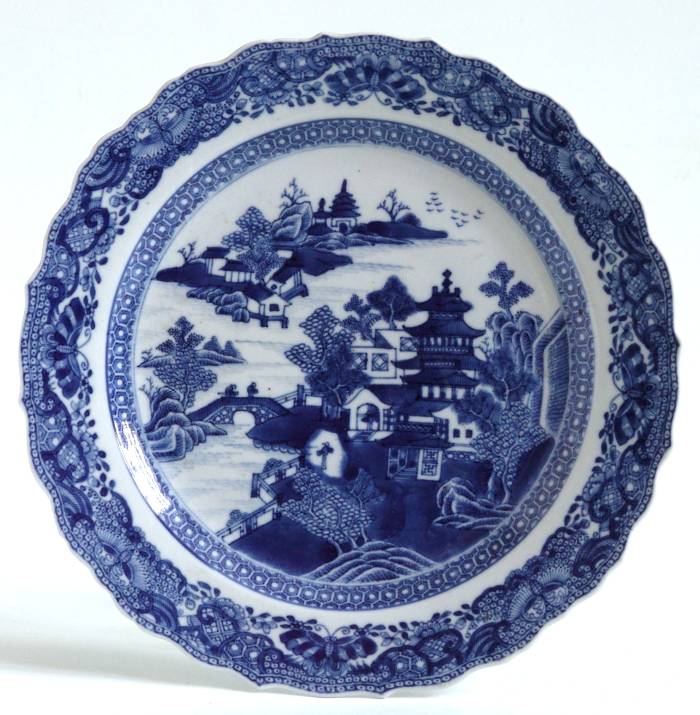
38. Blue and White Plate With Pavilion and Landscape Pattern
Qianlong period, Qing dynasty c.1760-80
Md 24 cm, H 2.5 cm, Fd 14 cm
(Coll.: AW)
Painted in under glaze cobalt blue, it depicts a seascape surrounded by a diaper border in the well and on the rim a continuous fringe of flowers and diapers and butterflies. The shape is a typical European shape.
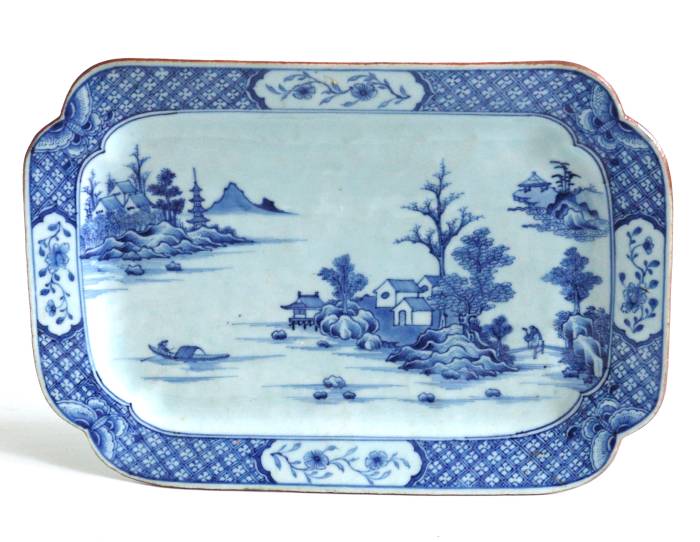
39. Blue and White Rectangular Dish
Qianlong period, Qing dynasty 1760
Md 32 x 22 cm, H 3 cm, Fd 24 x15cm
(Coll.: AW)
A rectangular four lobed shape painted in under glaze cobalt blue, depicting a waterscape with man in boat, a person crossing a bridge, houses and a pagoda.

40. Blue and White Dish With Flower and Figure Pattern
Qianlong period, Qing dynasty c.1750
Md 28 x 19.7cm, H 3 cm, Fd 21.7 x 13 cm
(Coll.: AW)
Shaped like a European Rocco silver dish, it is decorated in under glaze cobalt blue with a lady and dog on a boat in a waterscape surrounded by a diamond diaper on the rim and a continuous scroll of fish roe and flower.

41. Blue and White Shaving basin
Qianlong/Jiaqing period, Qing dynasty, the end of 18th century
Length 31.5, width 26 cm, height 7 cm. Foot-ring 14.9 x 10.1 cm
Collection of the City Museum of Gothenburg
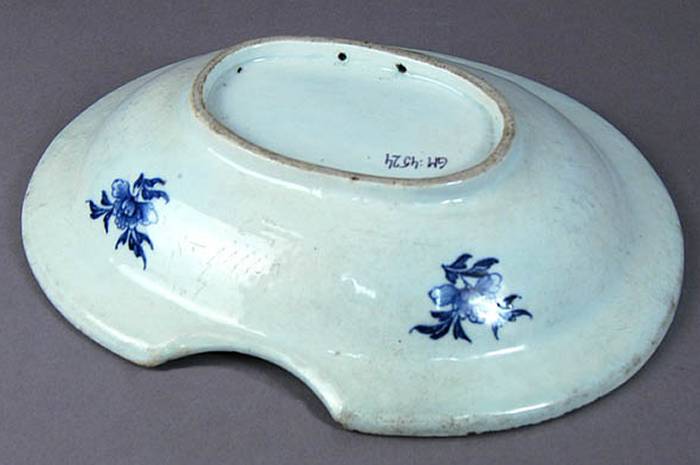
Oval basin of heavy porcelain, with semi-circular cut-out rim. Painted decoration in under-glaze blue: river scape with house and boat. Three floral motifs decorate the rim. A couple of peony sprays on the underside.

42. Blue and White Tureen with Landscape Pattern
Qianlong period, Qing dynasty c.1770
L 26 cm, Md 25 cm, H 23.5 cm, Fd 17.5cm
(Coll.: AW)
Rounded sides with shaped upright loop handles, stands on a splayed foot; lid surmounted by a peach finial with three applied leaves. Sides painted in under glaze cobalt blue with chrysanthemum, peonies and fruits; foot has fungi, pearl, fan and book symbols; lid is painted with plants and flowers. The applied leaves and handles are in cobalt blue.

43. Blue and White Butter-box
Late Qianlong period, Qing dynasty
Measures (lid and dish inclusive): length 15.7, width 12.5, height 9 cm; foot-ring of the dish 9.5 x 6.5 cm
Collection of the City Museum of Gothenburg
Oval, miniature tureen shape with lidded dish, lid has knob, no handles. Blue under glaze decoration: river-landscape with two-storied Chinese house, rocks, and flying birds in the sky. Flowered border in sections with different background-patterns--scrolls, honeycomb, etc. Probably brought to Sweden by Abraham Samuel Blix (1747-1804), marine lieutenant, who served as mate in SOIC during the third and fourth charters 1766-1806.

44. Blue and White Armorial Porcelain Tureen
Jiaqing period, Qing dynasty c.1810
Mouth 31 x 22.5 cm, H 22.5cm, foot 19 x 15 cm
(Coll.: AW)
Bombe-shaped with two entwined handles and lid with a fruit finial; painted in under glaze cobalt blue with two medallions encircled by spearhead borders on bowl and dense diaper and spearhead borders on foot, rim and lid.
This design is a late version of the 'Fitzhugh pattern' introduced in the 1770's by Thomas Fitzhugh, a captain in English East India Company, stationed in China 1779-81.

45. Blue and White Goblet
Kangxi period, Qing dynasty c.1700
Md 8 cm, H 11.2 cm, Fd 5 cm
(Coll.: AW)
Tapering octagonal shape on a domed foot decorated in under glaze cobalt blue with/alternating landscape and plants with birds on the eight facets; speckled diaper around rim, two spiral borders on the stem and leaf border on the foot. The shape is derived from the European glass model.

46. Blue and White Wine Cup with Flower Pattern
Qianlong period, Qing dynasty c.1770
Md 7, H 10, Fd 4.2 cm
(Coll.: AW)
High stem, painted in two shades of cobalt blue under glaze, on a soft paste (hua shi) surface. Decorated/flowers on cup, banana leaves around the stem, ruyi on the interior and stylized leaves around the base. Shape derived from European model. It is possible that the cup was used for white liquor especially genever (type of gin.)

47. Blue and White Ewer with Peacock Pattern
Qianlong period, Qing dynasty
Mouth 16.9x 10.3 cm, H 23.5 cm, Fd 9.4 cm
(Coll.: AW)
Meissen style and with sweeping molded curves; painted under glaze with cobalt blue, decorated on each side with flower sprig and stylized animals with dragonhead and peacock feathers in mid section, tassels around the mouth and molded lotus leaves around the foot. Such ewers usually had rustic stalk handles with pruned knots and frequently a metal hinge linking the upper forward part of the handle pierced for a metal hinge. Howard & Ayers, China for the West.

48.Blue and White Chocolate Jug/Coffee Pot
Qianlong period, Qing dynasty c.1760-70
Md 6.2 cm, H. 21 cm, Fd 7 cm
(Coll.: AW)
Copying the Silverware shape, with domed cover, decorated with under glaze cobalt blue on white soft paste, hua shi, porcelain; a tree on one side, pagoda landscape on the other. Lid and handle pierced for a metal hinge. Ear shaped handle has typical thumb support. Made after a European baroque metal prototype; motif may be linked to Anson's travels.

49. Blue and White Octagonal Ewer
Qianlong period, Qing dynasty 1740s
Length inclusive of spout 25.3, width 15.5 cm
Bottom 23.1, height 23 cm. GM 4631
Collection of the City Museum of Gothenburg
Imitation of an octagonal wooden vessel. At the closed top is an imitation crossbar or bolt between uprights; the bolt has a handle in form of pair of seals with/ball between their mouths; a hole with lid at one side of the closed top and a spout of pewter high up on the opposite front side - the lid has otter shaped finial. Painted oriental decoration in under-glaze blue on top and sides: floral or twig and bird-motifs on sides.

50. Blue and White Teapot with Landscape Pattern
Qianlong period, Qing dynasty 1790
Md 9.2 cm, H 12.5 cm, Fd 11.1 cm
(Coll.: AW)
Straight spout and flat lid with lizhi finial and entwined strap-handle, decorated with under glaze cobalt with European houses and willow landscape. Decorated after a European print. English 'New Hall' porcelain; sometimes called 'Trench Mortar' in Europe. spout shaped to fit a metal application.

51. Blue and White Coffeepot
Qianlong/ Jiaqing period, Qing dynasty c. 1800
Md 7.5 cm, H 24 cm, Fd 13 cm, width 21cm
(Coll.: AW)
Conical shape, lid with lizhi shaped finial; straight spout and twisted twin handle with under glaze cobalt blue seascape with sea and pavilions.

52.Blue and White Candlesticks
Qianlong, Qing dynasty c.1780
Md 5cm, H 12 cm, dish d. 10 cm
(Coll.: AW)
Under glaze cobalt blue motif of riverscape and pavilion and with blue bifurcated dragons (zhilong) supporting stems.

53.A Blue and White Saltcellar with Three Legs
Qianlong period, Qing dynasty c.1750
Md 6.3 cm, distance between feet 4 cm, H 4.7cm
(Coll.: AW)
Decorated with under glaze cobalt on interior with willows and lotus pond; exterior with alternating brocade panels of lotus and bamboo. Copy of an English silver saltcellar.

54. Blue and White Globular Pot (cuspidor)
Qianlong period, Qing dynasty c.1750
Md 12.5 cm, H 8.5 cm, Fd 8.3 cm
(Coll.: AW)
Rounded rim and loop handle; painted under glaze with cobalt blue tree peonies and bamboo on the exterior, three peony branches on rim and formal flower spray on the handle. From Dutch East Indiaman Geldermalsen (Nanking Cargo), which sank in 1752. Used by tobacco chewers.

55. A Blue and White Spittoon
Qianlong period, Qing dynasty c. 1750-60
Md 13, H 10 cm, Fd 5 cm
(Coll.: AW)
Spherical with flared rim decorated under glaze with cobalt blue. Decorated with peonies and chrysanthemum in garden on body and fish roe, diapers and stylized flowers on rim.

57. Blue and White Armorial Plate for the Grill Family
Qianlong period, Qing dynasty c.1750-60
Md 24.8 cm, H 2.3 cm, Fd 14 cm
(Coll.: AW)
Scalloped rim painted under glaze cobalt blue with crane with grasshopper in its beak and standing on stones placed on a plinth. Rim and well are decorated with massive floral and Rocco ornaments. Shape similar to European silver; thickness is typical of faience from the period.
Grasshopper is 'grillo' in Italian, "crane and grasshopper" design was the pseudo arms of the Grill family, who though not ennobled, were one of the most important families for the Swedish East India Company. Four members were directors at different times; they ordered at least eight different services between late 1740 and 1780.
Tin glazed European Earthenware
Copying designs from Chinese export porcelain

56. Blue and White Saucer-dish
Rörstrand c. 1750
Diam. 22 and 12, height 4 cm
Collection of the City Museum of Gothenburg
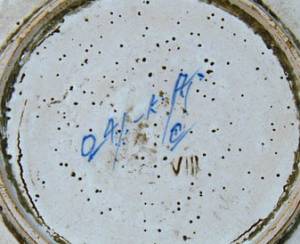
Faience with tin-glace and painted decoration in cobalt blue, inspired by Chinese porcelain: in center the motif "bird on the twig;" the rim with diaper-border interrupted by panels with floral motifs. Rörstrand is the oldest faience factory in Sweden; it began operation in 1727 in Stockholm.
58. Swedish Blue and White Flat-rimmed Plate
Rörstrand, Sweden, 1701
H. 2.8 cm, D mouth 22.8 cm D foot 12cm
Collection of the Röhsska Museum of Design and Applied Art, Gothenburg
Faience, (tao) with pale bluish white glaze painted in cobalt blue on brim and well and a central scene with fruit-trees growing from a rock. Signed: St 17/9 01. Purchased in 1910.
59. Swedish Blue and White Octagonal Dish
Rörstrand, Sweden, 1757
Mouth 32.8x23.3, Bottom24x15, H.2.2 cm
Collection of the Röhsska Museum of Design and Applied Art, Gothenburg
Faience, (tao) with white glaze painted in cobalt blue with central scene of islands and distant mountains surrounded by boarder with sprays of peony and lotus. Painted by Jonas Åberg, signed. Stockholm 26/3 57 - ÅB. Purchased in 1930.
60. Swedish Blue and White Large Flat Rimmed Round Dish
H. 5.7 cm D.42, 7 cm D. (foot): 20.7 cm
Rörstrand, Sweden
Collection of the Röhsska Museum of Design and Applied Art, Gothenburg
Faience, (tao) with pale blue tinted white glaze and decor in dark cobalt blue over glaze (camaieu) Rim with so-called "Berain" ornament (Jean B. 1637-1711 French designer), with three crowns and cartouches and shell-shaped ornaments and Pole Star in center. Probably designed by Christian Precht (C.B.1706-1779, Swedish designer,) painted by Johan Dahl, signed: Stockholm - J.D. Purchased in 1951.
61. Swedish Octagonal Tea Caddy
B 7,5 cm Deep 5,2 cm D mouth 2,7 cm H 12cm
Rörstrand, Sweden, c. 1740
Collection of the Röhsska Museum of Design and Applied Art, Gothenburg
Faience, (tao) with white glaze, painted in cobalt blue with roses growing from rock and trelliswork. Decoration by Johan Hedberg Signed: Stockholm - JHB. Purchased in 1927.
Chinese export porcelain
of fencai (famille rose) or wucai (Imari) type

62. Blue and White Plate In the 'Imari' Palette
Kangxi/Yongzheng period, Qing dynasty
Md 23 cm, H 3cm, Fd 12.5 cm
(Coll.: AW)
Under glaze cobalt blue in combination with iron red and gilt over glaze, with flower bouquet in the center, surrounded by two diaper borders divided by flowers on well and rim. In Europe the name 'Imari' is used for porcelains in the blue, red and gold palette, which copied Japanese export wares made in the late 17th, early 18th centuries.

63. Blue and White Plate With Famille-rose Decoration
Qianlong period, Qing dynasty, c. 1750
Diam. 40.5, height 4.7 cm. Diam. of foot-ring 25 cm
Collection of the City Museum of Gothenburg
With scalloped rim; decorated in under-glaze blue and enamels of famille rose type. Under glaze blue decoration of small scrolls with scattered peonies. Reserves with polychrome decoration: one small six-foiled in the center with motif of flowers and butterflies, three greater pumpkin-shaped ones around, with river landscapes, partly covering the well and the rim.

64. Famille-rose Pieces of a Tea Service, Margareta Elisabeth Walcke - Initials MEW
Jiaqing period, Qing dynasty c. 1800
1) Sugar-urn with lid; Diam.18 and 7.8 cm, width 14.5, height 15. cm
2) Cream-jug, Length 16.4,width 8.4, foot's diam. 7.3, height 12.4 cm
3) Oval dish stand for teapot 18 x 15.4 cm, height 1.7cm
4-5) Teacups and saucers, 2 pairs. Cup's diam. 11.2 and 5.5cm, height 5.8 cm
Saucer's diam. 15.5and 9.1 cm, height 3.7 cm
Collection of the City Museum of Gothenburg
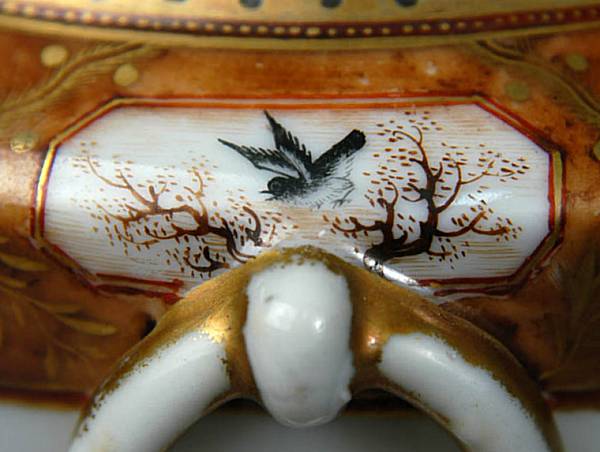
Painted in enamels and gold. Monogram MEW and broad border in copper color, marbled with gilt floral pattern and panels. Within latter are varied miniature landscapes en camaieu in sepia, alternating with varied bird and twig-motifs painted in black and gray enamels, and also, in one of the latter on each piece, a hidden monogram J.T. Two types of smaller borders at edge and as inner circle on saucers and dish. Small flower sprays flank the central monogram.
The monograms refer to Margareta Elisabeth Walcke and her husband (after 1776) Jonas Tranchell (1740-1809), who ordered the service. He was treasurer of the SOIC (1766-95) and in 1798 became one of the directors of the fourth charter (1786-1806). Four of his younger brothers were involved in SOIC as well: Sven served as ship's priest on three voyages in the 1780s, Carl Henrik was SOIC's secretary during the fourth charter 1786-1806, and Per was captain on two voyages 1785-90. Moreover, Margareta Elisabeth Walcke's uncle Thure Gabriel Walcke was senior examining customs officer in Gothenburg, responsible for control of East Indian goods.

65. Famille-rose Cup and Saucer with Hunting Pattern
Qianlong period, Qing dynasty 1760-70
Cup: Md 6.3 cm, H 5.9 cm, Fd 3.3 cm. Saucer: Md 11.9 cm, H 2.5 cm, Fd 6.9 cm
(Coll.: AW)
famille rose enamels (fencai) depicting a Chinese hunting party with village in background.

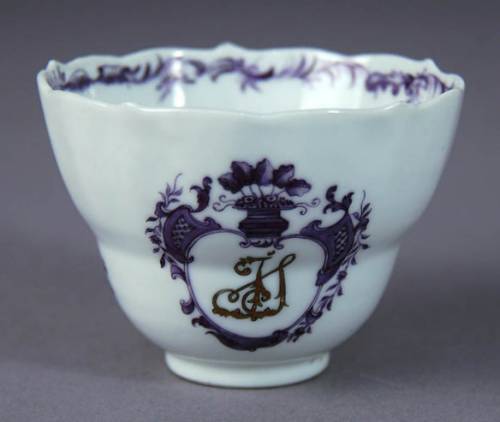
The cup of with waist with fluted rim and shaped ear; saucer with cup well and upturned rim. Painted in violet enamel and gold: a rococo-cartouche with monogram IS, stray flowers, and at mouth on inside a rococo-vine.
66. Famille-rose Cup and Saucer with Armorial Patterns
Qianlong period, Qing dynasty 1780s
Cup's diam. 9.3 and 3.5, height 6.8, length incl. the ear c. 10 cm. Saucer's diam. 7.5 and 14, height 3.8 cm
Collection of the City Museum of Gothenburg
67. Famille-rose Coffee cups and saucers With Armorial Pattern "ELLSBO"
Qianlong / Jiaqing period, Qing dynasty, end of the 18th century
Cup's diam.6.7 and 4.4 cm, height 6.8 cm
Saucer's diam. 8.3; height 3.4 cm
Collection of the City Museum of Gothenburg
Painted decoration in enamels and gold: drapery border in mauve and gold, shield with name Ellsbo, surrounded by small yellow flowers with green leaves. Inside of cups is vine in gold and green; same vine forms an inner circle on saucers. The service, which also includes punch bowls and cups, was ordered by county treasurer Fredrik Magnus Åkerman (1754-1830) owner of Ellesbo estate on Hisingen Island close to Gothenburg.

68. Gilt Famille-rose Handled Cup and Saucer for the Swedish King Gustav III to commemorate his revolution in August 19th 1772
Qianlong period, Qing dynasty, 1776
Saucer: Md 13.9 cm, H 3.2 cm, Fd 8.4 cm. Cup: H 6.8 cm, Md 6.5 cm, Fd 4.4 cm
(Coll.: AW)
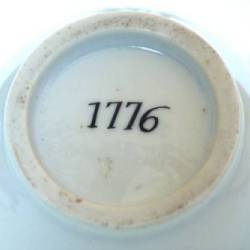 Decorated with over glaze enamels, fencai, with a gilt letter G on a blue background under a royal crown and a gold laurel wreath with mark 'D.19 AUG.1772'. Four small flower sprigs surround the medallion; gilt rims. On bottom in black is the mark 1776.
Several similar were ordered by the Swedish King Gustav III to commemorate the revolution in August 19th 1772 and were given to his loyal supporters.
Decorated with over glaze enamels, fencai, with a gilt letter G on a blue background under a royal crown and a gold laurel wreath with mark 'D.19 AUG.1772'. Four small flower sprigs surround the medallion; gilt rims. On bottom in black is the mark 1776.
Several similar were ordered by the Swedish King Gustav III to commemorate the revolution in August 19th 1772 and were given to his loyal supporters.

69. Famille-rose Teapot and Cup of Gilt Armorial Pattern for the City of Gothenburg
Early Qianlong period, Qing dynasty (1736-95)
Length incl. spout and handle 18.5, diam. 11 and 6, height 12.5 cm
Collection of the City Museum of Gothenburg
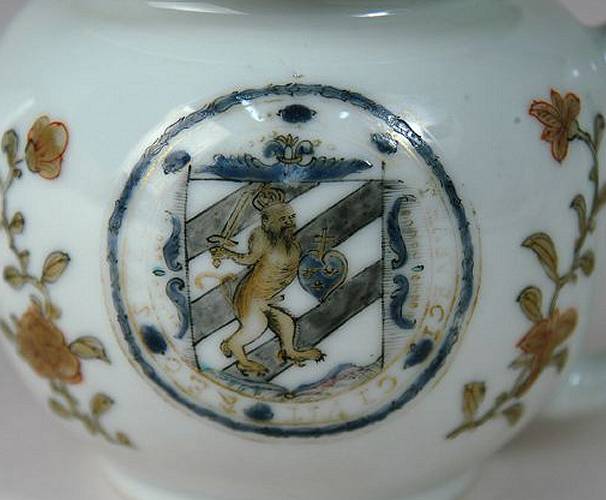
Decoration is sketched and painted in enamels: blue, iron red, pink, green, black and gold. The main motif is arms of Gothenburg: within a shield with diagonal stripes in white, blue and gold is a crowned, standing lion with double-tipped tail, holding a sword in one hand and a shield with three crowns in the other; the lion is more like a naked European bearded man. Ornaments and a wreath of laurels surround the armorial shield. Also decoration of gilt flower-sprays sketched in black and iron red.
The teapot is globular with straight spout, looped handle and low foot; low-domed lid with onion-shaped finial. On this piece, the peculiarity of the armorial lion is most evident.

70. Famille-rose Cup with Armorial Patterns Yongzheng period, Qing dynasty (1723-35) Diam. 7.5 and 3.6, height 4 cm Collection of the City Museum of Gothenburg
Thin porcelain with over glaze decoration in enamels, grisaille and gold: unidentified coat of arms with a baroque mantle of acanthus, and on the opposite side a floral motif in grisaille and gold; a diaper border in grisaille and gold on the inside of the mouth.
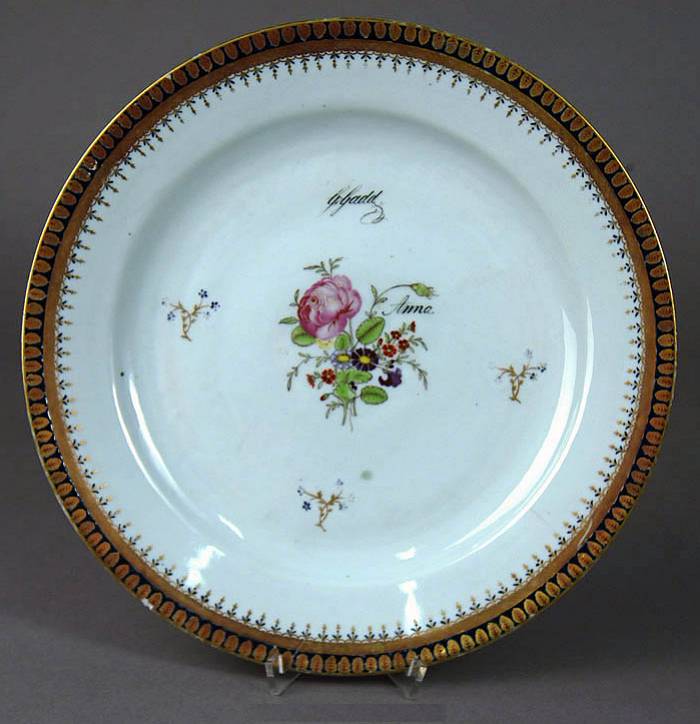
71. Famille-rose Punchbowl with Plate
Jiaqing period, Qing dynasty, 1800
Bowl dimensions: diam. 29 and 14.5, height 12 cm
Plate: diam. 31 and 17.8, height 3.5 cm
Collection of the City Museum of Gothenburg
Painted decoration in enamels: main motif of a bouquet with/red rose, smaller flowers in blue and yellow, green leaves; scattered small flower sprays. Guilt borders: one of leaves, one of spearheads. Inside has a border in blue enamel with gilt stars. Swedish inscriptions in handwriting: on bowl's outside: 1) Anna 2) En älskvärd maka för mitt hjärta / Ett hem lugnets fristad är / De äro nog för mitt begär [A lovable spouse for my heart / A home as a calm retreat. These are the only things that I need]; on the bowl's inside: 3) Att älska dig, att vörda dig / skall bli en lag för mig [Loving you, respecting you / will be a law to me]; on the plate: 4) G. Gadd.
The piece was brought from Canton by the captain Gabriel Gadd as a gift to his wife Anna. Gabriel Gadd. A lieutenant in the Swedish navy he captained two Swedish East Indiamen to Canton: Östergötland in 1799-1801, and Prinsessan in 1802-03.

72. Famille-rose Punch bowl with Ship Pattern
Qianlong period, Qing dynasty c.1790
Md 23 cm, H 10 cm, Fd 12 cm
(Coll.: AW)
Famille rose enamels (fencai) decorated around the foot and interior rim with pink geometric border. The main motif is two crewed ships, with 18th century rigging with Swedish flag and small sprays of flowers on both sides of the ship.

73. Famille-rose Punchbowl with Flower Pattern Qianlong / Jiaqing period, Qing dynasty c.1795-1800 Md 29 cm, H 12 cm, Fd 15cm (Coll.: AW) Famille rose enamels (fencai) decorated on exterior with two flower baskets; around the rim, two borders, one black with polychrome flowers and one over glaze cobalt blue with gold stars. Inside the rim is a blue and gold border and in the center a floral bouquet.

74. Gilt Famille-rose Punch Bowl
Qianlong period, Qing dynasty c.1795
Md 33 cm, H 14 cm, Fd 17.8cm
(Coll.: AW)
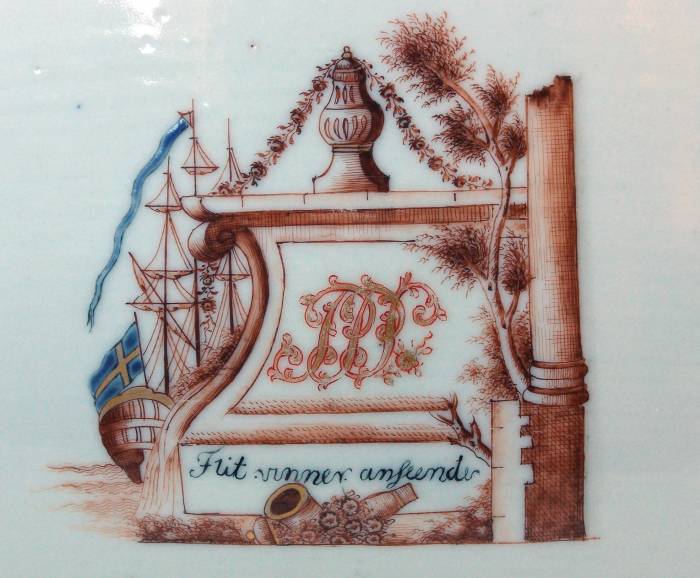
Painted with famille rose enamels, fencai, decorated inside with floral bouquet, a brown and gold chain around the rim and, on the exterior, a key fret border in brown and gilt and a monument with monogram and inscription in Swedish: flit vinner anseende (Diligence gains reputation) partly hiding a Swedish East Indiaman with a Swedish flag.

75. Famille-rose Plate with Armorial Pattern
Yongzheng period, Qing dynasty, 1730s
Diam. 21.5 and 12.9, height 3 cm
Collection of the City Museum of Gothenburg
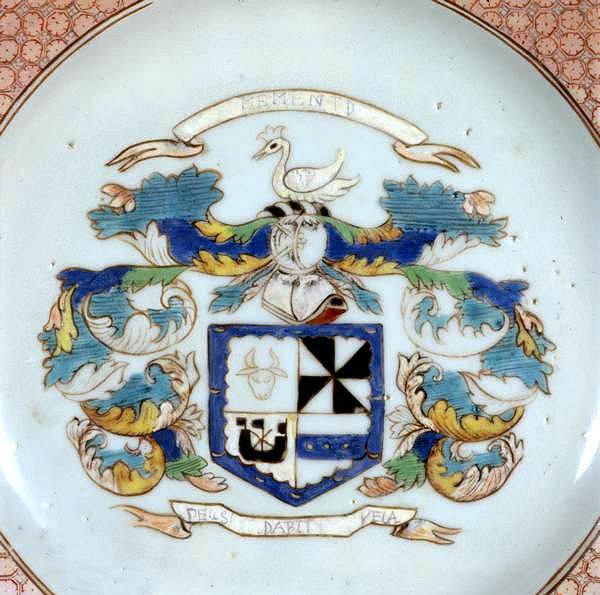
Over-glaze decoration in enamels, including rose pink. In the center the coat of arms of Colin Campbell surrounded with acanthus foliage and text ribbons with his motto: Memento / Deus dabit vela [Remember / that it is God who gives us the sails].Broad diaper band on rim in rose pink interrupted by four reserves with polychrome flower-motifs. The first charter of SOIC was given to Heinrich König & Company on 14 June 1731. König's companions were Fredrik Bedoire and Scotsman Colin Campbell (1686-1757) who is considered the promoter of SOIC. He became a naturalized Swede and was ennobled in 1731, the same time he became director of SOIC. The service probably was ordered at the company's first expedition to China with the ship Fredericus Rex Sueciae 1732-33, on which Campbell served as first supercargo.

76. Gilt Famille-rose Dish with Armorial Pattern - arms of Swedish King Fredrik I, from Hessen
Early Qianlong period, Qing dynasty (1736-95)
Diam. 35.5 and 20.5, height 5 cm
Collection of the City Museum of Gothenburg
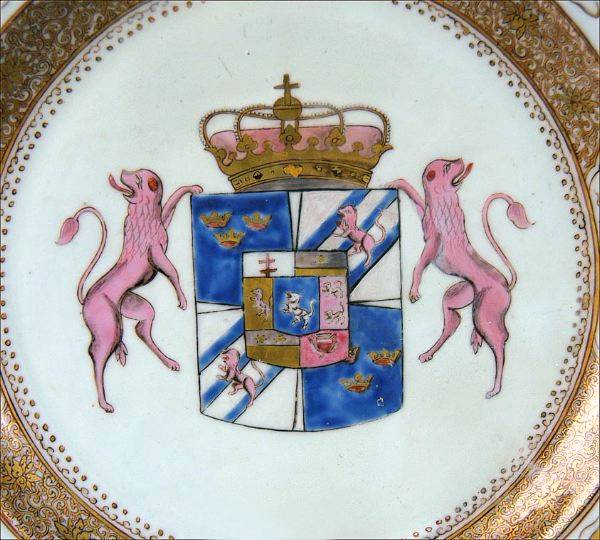
Large dish with decoration in gilt enamels: in the middle the Swedish national arms under the royal crown, with arms of Hessen as escutcheon. Lions in rose-pink enamel hold the shield. In the well a border of plum flowers with four floral ornaments, all in gold. Rim decorated with four peonies and in between four curling dragons. Piece of a service ordered in the 1730s for Swedish King Fredrik I, who was born prince of Hessen, Germany.

77. Gilt Famille-rose Plate with Armorial Pattern - Swedish family Grill
Qianlong period, Qing dynasty c. 1750
Diam. 13.3 and 22.4, height 2.5 cm
Collection of the City Museum of Gothenburg
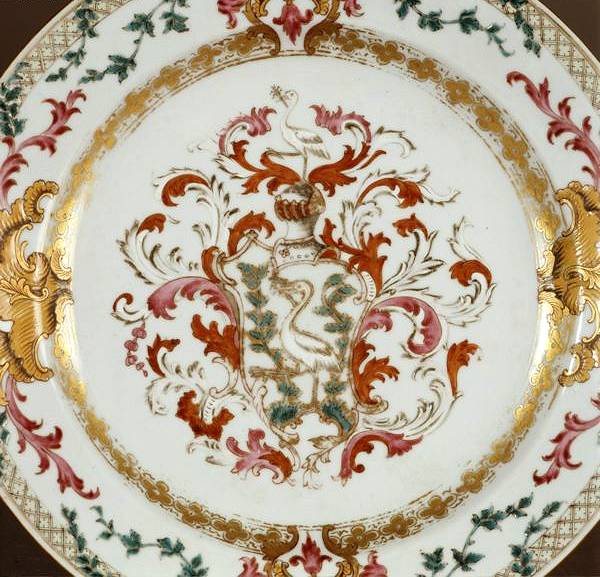
Decoration in gilt enamels: the coat of arms of the Swedish family Grill (never ennobled) in an asymmetric rococo-shield and a baroque setting of acanthus almost filling up the center. In the well-gilt border are flowers with four petals. Rim with four gilt rocailles, overlapping a diaper-border at the edge, and leaf-vines. The family Grill played a crucial part in the SOIC: four members were directors in the Company, during the first and second charter 1731-66 Abraham Grill and his half-brother Claes Grill. The latter was also a great part owner in the shipyards in Stockholm where most of the Swedish east Indiamen were built.

78. Gilt Famille-rose Dish with Armorial Pattern - Erik Wrangel of Lindeberg
Early Qianlong period, Qing dynasty (1736-95)
Diam. 31.7 and 18.4 cm, height 4.5 cm
Collection of the City Museum of Gothenburg
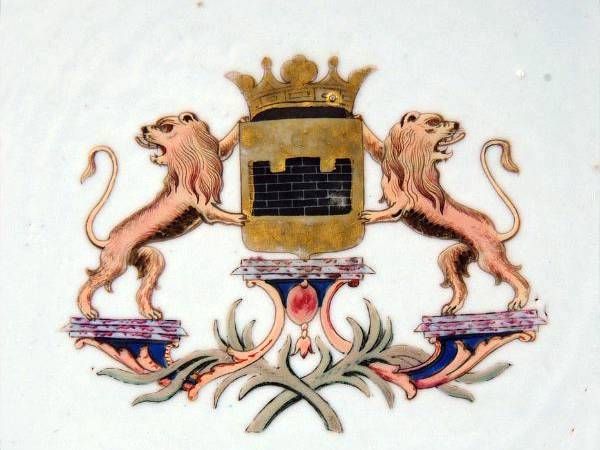
Polychrome decoration in gilt enamels. In the center the arms for Swedish noble family Wrangel, supported by lions; gilt S-border with palmettes surrounds the arms. In the well a vine interrupted by eight flowers in gold. On the rim are four flower-sprays. Probably ordered in the 1730s for the Lord Lieutenant/Councilor (1739-44), Erik Wrangel of Lindeberg (1686-1765), who was one of the subscribers of first SOIC charter--1731-1746.

79. Famille-rose Spoon-tray with Armorial Pattern - von Höpken
Qianlong period, Qing dynasty 1730s
Length 12.6, width 6.4, bottom 11 x 6.4, height 1.9 cm
Collection of the City Museum of Gothenburg
Shaped, oblong form. Painted decoration in gilt enamels: in the center, arms of Swedish baronial family von Höpken; rim decorated with a border in Chinese style--four peonies with four curling dragons. In the well a border with plum flowers interrupted by four mallows. Piece of large dinner service and tea, ordered in the 1730s for the Under-Secretary of State, Baron Daniel Niklas von Höpken (1699-1741). In 1720 he got a royal charter on East-India trade but never used it. Later he became one of the subscribers during the first charter of the SOIC 1731-1746.

80. Famille-rose Plate with Armorial Pattern - Cedercrona
Qianlong period, Qing dynasty 1740s
Diam. 22.5 and 12, height 4.4 cm
Collection of the City Museum of Gothenburg
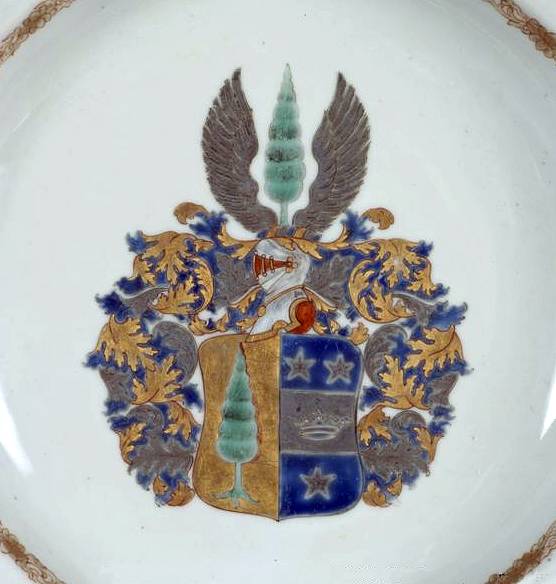
Decoration in gilt enamels: in center the arms of Swedish noble family Cedercrona. In the well a gilt border with small flowers, interrupted by greater flowers. On the rim three peony-sprays in famille rose colors and gilt border of spearheads.

81. Gilt Famille-rose Large Saucer with Armorial Pattern - Count Mörner and Duwall
Qianlong period, Qing dynasty 1750s
Diam. 20 and 13.1 cm, height 4 cm
Collection of the City Museum of Gothenburg
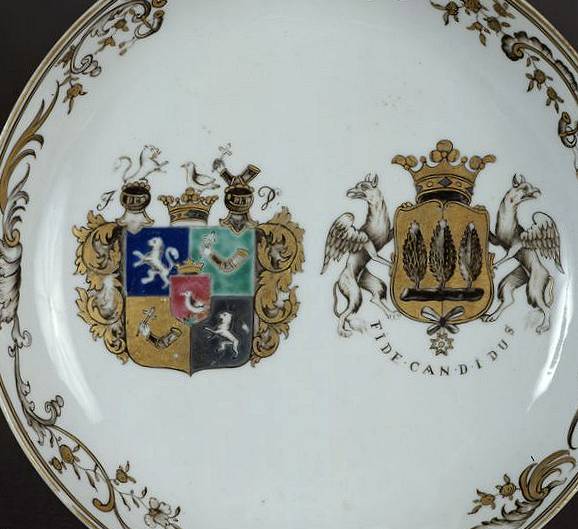
Main decoration in gilt enamels of two coats of arms: Count Mörner and Duwall. The Mörner arms are combined with the decoration of a Swedish order, hanging underneath, as well as Latin motto: FIDE CANDIDUS. On flanks of Duwall arms are initials F and D. Border of a rococo-vine in grisaille and gold.
Piece from a service ordered for Major, Count Carl Johan Mörner (1698-1782), and baroness Fredrika Duwall (1722-1801), who got married in 1743. The piece cannot however have been ordered before 1750 when Mörner became Knight of Svärdsorden (Order of the Sword). According to convention, the male coat of arms should have been to the right of the female one.

82. Famille-rose Soup plate with Armorial Pattern - Anders Bachmanson Nordencrantz
Qianlong period, Qing dynasty 1745-50
Md 23.6 cm, H 4.2cm, Fd 12.6cm
(Coll.: AW)
Decorated in famille rose enamels, fencai, with a large coat of arms in black, cobalt blue, iron red and gilt under a helmet and surrounded by a mantle in pink and gold crowned by a bear holding a star and a laurel. Rim border decorated in famille rose colors with shells, kilns, volcanoes, tools, waterwheel and bears, showing Nordencrantz' industrial engagement. The design is from an English service. The coat of arms belongs to the noble family of Anders Bachmanson Nordencrantz; he was member of Board of Commerce and one of the main participants during the second charter (1746-66). He ordered the service after he was ennobled in 1743.

83. Famille-rose Soup plate With Armorial Pattern - Jacobite
Qianlong period, Qing dynasty c.1740-50
Md 23cm, H 4.2cm, Fd 12.2 cm
(Coll.: AW)
Painted with famille rose, border decorated in pink, gilt and blue enamel, gold in four sea shells and garlands, two bows and quivers and two music staf and lyre emblems in black and purple. The well has a flower scroll in white enamel, bianco sopra bianco; the main motive is a shield, in red, blue and gold where a unicorn and a lion supports a central shield. The motif is currently not identified but could be interpreted as in support of the Jacobite cause. The staff, lyre and, bow and arrow are the attributes of the Greek Gods of Apollo and his protégé, Hermes, God's messenger and protective God of trade. The central arms is actually that of England and Scotland, where the unicorn is not 'in chains' as it usually should be depicted and where the Scottish unicorn is emblazed from the crown. The blue and yellow bars in the central shield could be interpreted as the colors of Sweden. (Howard and Ayers p. 454 have a different theory.

84. Famille-rose Plate with Armorial Pattern - Anna Elisabeth Pike and Jacob Jeansson von Utfall
Qianlong period, Qing dynasty c.1765
Md 45 cm, H 6.8 cm, Fd 26 cm
(Coll.: AW)
Decorated in famille rose enamels, fencai, with initials in the well as flower scrolls and two towers with Swedish flags under golden cartouches with the inscriptions: PLACIDO ROBORE. (In tranquility safety) In the center a bamboo and flower gilt and poly chrome garland around the Latin text from Juvenalis' Satire 1 (c. AD100). The correct text should have been: [...] Quis ferat istas luxuriae sordes? Quanta est gula, quae (sibi totos ponit apros), animal propter convivia natum! (Who can stand these gruesome extravagances? What a glutton he is (who serves himself un-sliced boars) Oh, you animal created for a banquet!) The monograms might be AEP and JVU for Anna Elisabeth Pike and Jacob Jeansson von Utfall (1715-1791), who made four trips to Guangzhou 1736 and 1745, two as assistant and two as supercargo. Flower garlands style is in keeping with what was suitable for the manor house (Nääs) owner who, in 1765 celebrated his 50th birthday.

85. Gilt Famille-rose Plate - possibly Freemason
Qianlong period, Qing dynasty
Md 31.2cm, H 3.5 cm, Fd 18 cm
(Coll.: AW)
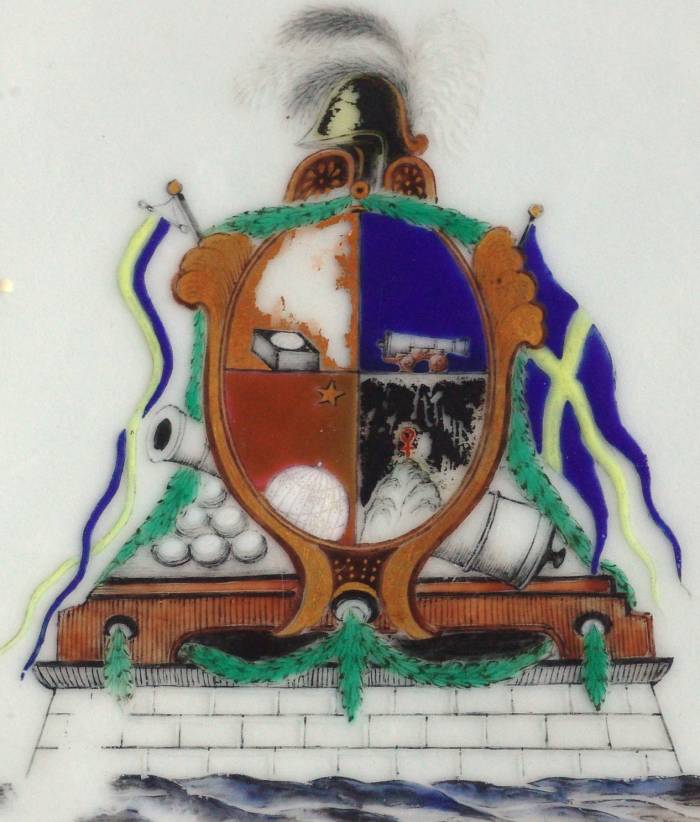
It is painted with famille rose enamels, fencai. In the center are Swedish flags, a canon and a helmet emblazoned in pseudo arms. The rim is decorated with brown and gilt border inside a blue border with gilt stars. A naval officer not belonging to the Nobility probably used this pseudo coat of arms, possibly a Freemason as the shield has a globe, mountain, cross and a book. The shape is a European metal shape.

86. Famille-rose Plate with Scalloped Rim - Gullbringa
Qianlong period, Qing dynasty c.1790
Md 24 cm, H 2.7cm, Fd 14.5 cm
(Coll.: AW)
Center painted with over glaze enamels, fencai, with seed plants (oats?) inside an over glaze cobalt blue circle between two gilded circles. A Mercurius staff, representing trade and a Neptune's trident, representing shipping, suspended in gilt and blue tassel and the word Gullbringa, in black letters; gilt and blue border on rim. Gullbringa is a Swedish Manor House, owned by H.H. Clason, who was Captain on four different ships to Guangzhou between 1782 and 1794.

87. Gilt Famille-rose Plate with Armorial Pattern - von Steijern
Qianlong period, Qing dynasty c.1750
Md 23 cm, H 3 cm, Fd 12.5cm
(Coll.: AW)
It is painted with over glaze enamels, fencai, with the letters RS in an over glaze blue shield supported by a lion and a Mercurii staff in the center. In the well a spearhead border and a rim border with shells and a 'European scroll', both in red and gilt. The lion is similar to the one found in the coat of arms of the city of Gothenburg and together with the staff it implies that the plate was ordered for a merchant in Gothenburg.
It has been suggested that the plate was made for the Swedish family von Steijern.

88. Gilt Famille-rose Tea pot stand - Carl Johan Gyllenborg
Qianlong period, Qing dynasty c.1776
Md 13 x12 cm, H 2 cm, Fd 10 x 9.5 cm
(Coll.: AW)
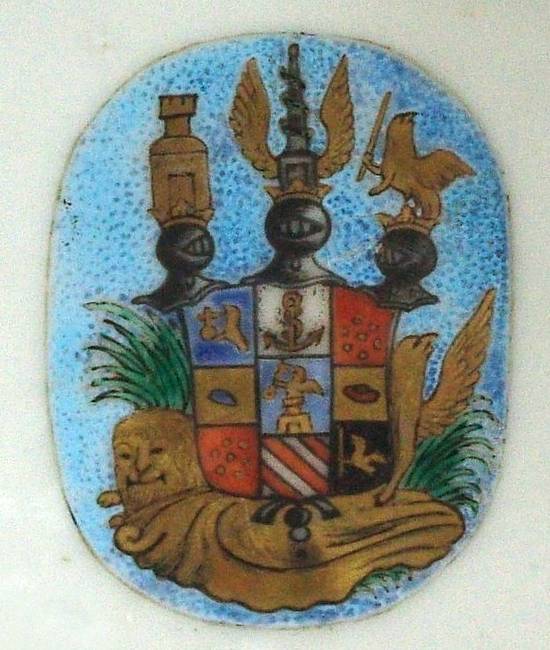
In hexagonal lobed shape decorated with famille rose, fencai, enamels with a patterned floral festoon on rim; in the center four tiny flower sprigs surrounding a coat of arms with three helmets over a checkered shield on a light blue oval. The coat of arms belongs to Carl Johan Gyllenborg married in 1777 to a daughter of D. Sandberg (1726-1778), SOIC. In a European silver shape.

89.Gilt Famille-rose Plate with Armorial Pattern - af Wirsén
Jiaqing period, Qing dynasty c. 1810
Md 19.9 cm, H 2 cm, Fd 11.5 cm
(Coll.: AW)
It is painted with famille rose, fencai, enamels, decorated with a border of blue and gilt and a shield, which has a bird and fish on the sides, under one flag belonging to the Swedish Navy and one to the Army's fleet. The coat of arms belongs to the family af Wirsén, which was ennobled in 1805; this service was probably not ordered via the SOIC.

90. Famille-rose Plate with Armorial Pattern
Late Qianlong period, Qing dynasty (1736-95)
Diam. 24 and 13, height 3.8 cm
Collection of the City Museum of Gothenburg
Rich over-glaze decoration in enamels of famille rose type: central scene showing an allegoric female figure, i.e. 'Hope' leaning on her oval shield with another coat of arms. Rim decorated with panels with allegoric representations of the four continents.
Piece of an English armorial service with arms for the families Martin and Ker, probably ordered by Sir Charles Martin, Director of the Medical Board of the Peninsular War, or his brother Robert Martin, serving in the Honorable East India Company, for their sister's, Jane Martin, marriage in 1790 with her cousin William Ker of Gateshaw.
91. Famille-rose Octagonal Plate with Peony and Peacock Pattern
Qianlong period, Qing dynasty c.1750-70
Md 22 cm, H 2.5, Fd 13 cm
(Coll.: AW)
It is painted with famille rose enamels, fencai, and decorated with peacock and hen on rockwork between peonies and peaches within borders of gilt spearheads and chain and ingot pattern divided by sprigs of flowers.

92. Famille-rose Plate with Flower Pattern
Jiaqing period, Qing dynasty c.1800
Md 24 cm, H 3 cm, 14.5fd cm
(Coll.: AW)
In flower shape, painted in famille rose enamels, fencai, with flower bouquet surrounded by four tiny sprigs in the center and an over glaze blue and gold dense border on the rim. Marked Anna in black. Service likely intended for Anna Gadd married to Gabriel Gadd who was captain on two expeditions to China 1799-1803. The pattern has a Meissen origin.

93. Famille-rose Plate with Interlocking Flower Pattern
Qianlong period, Qing dynasty c.1770
Md 41cm, H 5cm, Fd 25.5 cm
(Coll.: AW)
It is decorated in famille rose enamels, fencai, with flower bouquet in center surrounded on the rim and well by a flower festoon. In European style copying Marieberg (Gustavian runners).

94. Gilt Famille-rose Plate with Figure Pattern
Qianlong period, Qing dynasty c.1740
Md 16.2 cm, H 3 cm, Fd 9 cm
(Coll.: AW)
It is painted with famille rose enamels, fencai, and gold on the rim with sprays of flowers and three cartouches with people in landscape setting and in the center, similar but more elaborate motif in a gilt frame, 'á la chinoiserie'. The design is copying a Meissen pattern by J.G. Höroldt, who was inspired by a Chinese design.

95. Gilt Famille-rose Plate with Peony and Willow Pattern
Qianlong period, Qing dynasty c.1745
Md 22.8cm, h2.5cm, Fd 11.8 cm
(Coll.: AW)
It is painted in famille rose enamels, fencai, peonies with willow tree in center and pink rim with panels of peonies divided by three brown and pink lambrequins; our iron red lingzhi fungi on back.
96. Famille-rose Plate with Flower Pattern
Qianlong c.1770
Md 23 cm, H 2.2 cm, Fd 13.5 cm
(Coll.: AW)
Scalloped rim, painted with famille rose enamels, fencai, with flower Alstroemeria peregrina, in the center, a leaf festoon and iron red lines around the rim. Ordered by Claes Alströmer, who was married to S.C. Sahlgren, daughter of Niclas Sahlgren, one of the first directors of SOIC.
97. Famille-rose Octagonal Plate with Flower Pattern
Qianlong period, Qing dynasty c.1750
Md 25 cm, H 2.5 cm, Fd 14
(Coll.: AW)
It is painted with famille rose enamels, fencai, with insects and flowers on the rim and a bouquet of European flowers in the center. On the base an over glaze blue mark of a double sword, with copied Meissen trademark. The pattern is from a Meissen original.
98. Famille-rose 'Bulb' Bowl
Qianlong period, Qing dynasty 1750
Md 30 cm, H 4.4cm, Fd 16.6cm
(Coll.: AW)
Famille rose enamels, fencai, with dense brocaded border in iron red and gold and the convex center decorated with peonies and leaves, tendrils and flowers. Used as a stand for a kind of ewer in European metal shape. (Pantheen)
99. Gilt Famille-rose Sample Plate
Jiaqing period, Qing dynasty c.1800
Md 19.6 cm, H 2.4 cm, Fd 10.3 cm
(Coll.: AW)
Decorated with enamels in blue, green, pink, sepia and gold in four different borders. One border is checked with leaf pattern in blue and gold and the remaining in three different color combinations with grape vine and one cartouche with monogram. This 'sample plate' was used to show the buyers the range of patterns, styles of decorative elements and inscriptions, which could be made for individual orders, sent through agents to Jingdezhen. These borders were used till the beginning of the Daoguang period (1821-1850).
100. Famille-rose Small tureen and stand
Xuantong period, Qing dynasty 1910.
Md 19×16.7 cm, H 16.5 cm.
(Coll.: AW).
Painted with famille rose enamels (fencai). Pattern of good wish symbols such as shou characters, coins, deer, bats, butterflies, a painting and a sword in a scabbard, a vase and a diaper around the rim. In the crest the motto Fortiter et Celeriter (Strong in matter and Gentle in manner). On the reverse is the text: Alice och James Keiller Canton 1910, Da Qing Xuantong Nian Bao Xing Zuo, in iron red. A large service was ordered in 1910 when Mr. & Mrs. Keiller visited Guangzhou. It is possible that, to show their personal interest in arts and peace, they created the design themselves.
72. Gilt Famille-roseTeapot with Armorial Pattern
Qianlong period, Qing dynast 1780s
Diam. 12, length 21, height 14.2 cm
Collection of the City Museum of Gothenburg
with monogram, the body widens at bottom and contracts beneath the flat shoulder. Straight spout, laced handle and flat lid. Lower part, shoulder and lid decorated with molded ribbons. The latter has a low-finial. Painted decoration in gilt enamels: monogram, a large CL on both sides, is surrounded by flower-sprays and butterflies; both on the flat shoulder and on the lid are borders of interlaced ribbons and leaf-vines in main colors, wine red and gold. Unintended crackle.
Possibly ordered for Clara Lagerström (c. 1713-78), widow of Magnus Lagerström (1691-1757) who was SOIC's secretary during the first charter 1731-46 and one of its directors 1746-47 during the second charter.
73. Gilt Famille-rose Coffeepot with Armorial Pattern
Qianlong period, Qing dynasty, probably ordered in 1756 or shortly thereafter
Length 16.3, width 15.3 cm, height 24 cm; diam at the mouth 7.8 and at the bottom 12.4 cm
Collection of the City Museum of Gothenburg
Conical pot with spout and handle at right angle to each other. Domed lid with finial; spout and handle with molded relief decoration. Painted decoration in gilt enamels: arms for the Swedish noble family Mackenzie in combination with stray lower-twigs and spear-borders. Coat of arms was created for Major John Mackenzie of Macleod (1726-1789) in connection with his introduction in the Swedish House of Nobility in 1756. He was among the Scottish nationalist officers who fled from Scotland to Sweden in 1746 after the battle at Culloden on April 16. He resigned as colonel in the Swedish army in 1778, when he returned to Scotland getting back his former privileges and estates.
74. Gilt Famille-rose Teapot with Armorial Pattern
Early Qianlong period, Qing dynasty (1736-95)
Length 16.7 cm, height 11, diam. of the foot-ring 5.8 cm
Collection of the City Museum of Gothenburg
Globular pot with domed lid, looped handle and a straight spout with silver-mount. Over-glaze decoration in black, enamels and gold: the arms of the Swedish noble family von Utfall - almost filling up the body on both sides - is flanked by blue flower-twigs, and round the low neck is a gilt border of petals. The lid is decorated with flower-twig in blue enamel in combination with floral rococo-ornament in black and gold.
This pot was ordered either by Peter Jeansson von Utfall (1711-45) or Jacob Jeansson von Utfall (1715-91). They were sons of Johan (Jean) Utfall, captain in the marines, later admiral, who was ennobled under the name von Utfall in 1716 and introduced in the Swedish House of Nobility in 1719. Peter von Utfall made four voyages for SOIC as captain 1733-43. The first voyage went to India but the other three 1736-43 to Canton in China. He died during his last stay in Canton and was buried in the graveyard for Europeans northwest of the factory town. Jacob von Utfall served in SOIC's China-trade 1736-45, twice as assistant and twice as supercargo, before he settled at Nääs estate east of Gothenburg. Later, 1753-66, he was a director of SOIC.
75. Gilt Famille-rose Coffee Pot
Qianlong period, Qing dynasty c.1790
Md 7.0 cm, H 19 cm, Fd 10.4 cm
(Coll.: AW)
Coffee pot of cylindrical shape and lid with peach finial, porcelain, with perpendicular spout and pistol handle decorated with a blue enamel and gilt crest with letter S and around the mouth and on the lid a blue border with stars. Copy of a silver prototype ewer. The crest is of a type ordered for people not belonging to the 'Nobility'.
76. Famille-rose Milk Jug with Hunting Pattern
Qianlong period, Qing dynasty c.1760-70
Md 4 cm, H 13 cm, Fd 4.5 cm
(Coll.: AW)
Pear shape with lid painted in famille rose enamels (fencai). Scene of Chinese hunting party with village in background.
77. Famille-rose Ewer with Hunting Pattern
Guangxu period, Qing dynasty c.1890
Md 17 x 7 cm, H 14.5 cm, Fd 6cm
(Coll.: AW)
Loop handle with curving spout decorated in famille rose enamels, fencai on one side with roses, flowers, birds and butterflies and on other with an interior scene with people. The ewer, painted in Guangzhou, which has to be filled through a hole in the bottom, is called 'Cadogan ewer' in the West but it is a Chinese invention from the Northern Song period.
78. Famille-rose Sauceboat with Armorial Pattern
Qianlong period, Qing dynasty c.1785
Md 22 x 10.4 cm, H 8cm, Fd 8.8 x 7.9 cm
(Coll.: AW)
Rococo metal shape painted with famille rose enamels on exterior with flowery garland in red and green; in interior with a coat of arms, a crane in front of a blue and pink shield under an ermine mantle. The service was ordered by Colonel J.V. Tranefeldt, who was appointed Colonel in1781 and later lost the battle at Kvistrum in 1788, to the Danes and was dishonorably discharged the same year. Consequently he could not afford to pay for the service when it arrived in Sweden.
79. Famille-rose Coffee Cup with Flower and Bird Pattern
Qianlong period, Qing dynasty c.1780
Md 3.9 cm, H 3.7cm, Fd 1.9 cm
(Coll.: AW)
Unusually small, painted with famille rose enamels decorated with perched bird and a butterfly among flowers.
80. Gilt Famille-rose Mug/Tankard
Qianlong period, Qing dynasty c.1740
Md 9 cm, H 13 cm, Fd 7.5 cm
(Coll.: AW)
Bell shape, painted in famille rose enamels and gilt. Opposite the ruyi shaped handle a large, richly framed panel with a scene from a harbor with houses, people and a small boat unloading its cargo. On the sides, flower-sprigs in pink and gilt. Patterned after a Hörholdt Meissen design.
81. Gilt Famille-rose Mug with Armorial Pattern
Qianlong/Jiaqing period, Qing dynasty 1790s
Diam. 7.5, height 9.6 cm
Collection of the City Museum of Gothenburg
Cylindrical with looped handle. Painted decoration in European style in enamels and gold: medallion with monogram I H, flower sprays, and flower festoons hanging from gilt openwork border.
82. Gilt Famille-rose Soup Tureen
Qianlong/Jiaqing period, Qing dynasty 1790s
Length 31.5, width 24, height 21 cm; base measures 22.6 x 18.1 cm
Collection of the City Museum of Gothenburg
Oval, slightly foiled shape with a splayed base; laced handles, fastened with molded berries and leaves, domed cover with pinion finial. Painted over-glaze decoration in blue and gold: medallions with bouquets and borders of blue bands with diagonal leaves in gold, in combination with a blue string, loosely wrapped with leaf vine in gold.
83. Famille-rose Tureen and Stand
Qianlong period, Qing dynasty c.1750-70
Mouth 36 x 21 cm, H 23 cm, foot 18 x14 cm
Stand: L.38 cm, W.31.5 cm, H 5.1 cm, bottom 24.5 x19 cm
(Coll.: AW)
Oval shape with iron red shell handles with domed cover, which has an iron red shell-scroll finial. Tureen is painted with famille rose enamels with peacocks and hens on rockwork between peonies and peaches with in borders of gilt spearheads and chain-and-ingot pattern divided by flower sprigs.
84. Famille-rose Tureen In Fish Shape and Lid
Qianlong period, Qing dynasty c.1750
L 22.5 cm, H 5 cm, width 9 cm
(Coll.: AW)
In shape of a fish (carp); back and sides painted in black; belly and mouth painted in lighter tones, fins are in bright iron red over transparent glaze. Ordered for Niclas Sahlgren (1701-1776) one of the most important directors for the SOIC.
85. Famille-rose Square plate
Minguo period, 1913. M 21 x 21 cm, H 3.5 cm, Fd 15cm
(Coll.: AW).
Painted in famille rose enamels. The pattern, bo gu si, shows good wish symbols such as shou characters, coins, deer, bats, butterflies, a painting and a sword in a scabbard, a vase and a diaper around the rim. In the crest the motto Fortiter et celeriter (Strong in matter, gentle in manner). On reverse the text Alice och James Keiller Canton 1913 and in Chinese Min Guo Nian Bao Xing Zuo in iron red. A large set had been ordered in 1910 when Mrs. and Mr. Keiller visited Guangzhou. This plate probably belongs to a later order. It is possible that the Keiller's, to show their personal interest in Arts and Peace, created the design.
86. Gilt Famille-rose Tea Caddy with Armorial Pattern
Qianlong period, Qing dynasty, 1780s
Length 7.1, width 4.3, height 10.9 cm; bottom 7 x 4 cm
Collection of the City Museum of Gothenburg
Rectangular flask with arched, somewhat projecting shoulder. Over-glaze decoration in enamels: arms for the Swedish noble family von Rehren (never introduced in the Swedish House of Nobility) in a rococo setting with acanthus in brown and manganese violet on the broad sides. Stray-flowers on the shoulder and short sides.
87. Famille-rose Tea Caddy with Western Figure Pattern
Qianlong period, Qing dynasty c.1785
Md 3cm, H 13.3 cm, Fd 9x 4.6cm
(Coll.: AW)
Painted in famille rose enamels with pink medallion with wreathed head, which partly hides a lyre, within two concentric rings of over glaze enamel colors and thin drapery festoons in very pale color, looped through rings and on the shoulder a leaf scroll. This is probably one of the Muses, perhaps Clio.
88. White Glaze Famille-rose Tea Caddy with Armorial Pattern
Qianlong period, Qing dynasty c. 1750
Diam. 7 and 4.7, height 10.3 cm
Collection of the City Museum of Gothenburg
Over glaze decoration in enamels, iron red, black and gold: the crowned arms of the Swedish baronial family Broman, flanked by two 'wild men'. Ordered for Erland Broman (1704-57), president of Kommerskollegium [the Swedish National Board of Trade] in 1747. Made baron in the same year and in 1752 introduced in the House of the Nobility. Crackled; the lid is missing.
89. Famille-rose Vase
Late Qianlong period, Qing dynasty (1736-95)
Length 24, width 19.5, height 42.6, base 11 x 11 cm
Collection of the City Museum of Gothenburg
with pistol-handles and lid with/fruit-finial; molded floral festoons. Painted over-glaze polychrome decoration in enamels and gold: flower-sprays around an oval medallion with landscape in grisaille. One of a pair in European neoclassical form, in vogue in Sweden during reign of King Gustav III. This example has much in common with type produced by the Swedish faience-factory Marieberg in 1775.
90. Famille-rose Candlestick with Rooster Pattern
Qianlong period, Qing dynasty c.1770
Md 3 cm, H 19.5 cm, base 10.5 x 10.5 cm
(Coll.: AW)
On an eight lobed base, has ridged stem terminating in a circular nozzle; painted in over glaze enamels; base has four bats and landscapes in panels and stems with a roster, garlands and flowers in iron red, pink and gilt. Shape is after European metal originals.
91. Gilt Famille-rose Writing Stand and Desk Set
Qianlong period, Qing dynasty c.1785
L 20 cm, H 6.8 cm width 10 cm
(Coll.: AW)
Famille rose enamels of square shape with boxlike pen tray covered by a slightly domed lid and three compartments in the front containing one almost square ink-well, a pounce-pot and a fixed candle-holder in lotus bud shape. Sides of inkwell and pounce-pot are decorated with purple landscape, '100' antiques, and a bird with a rock and interior scenes with Chinese people around a table. The motif on the lid depicts a bird among peonies in a nature setting. rear of the stand depicts a landscape, painted in sepia, like an ink scroll, with two men in a boat and the front with flower-bouquets. The motifs represent classical Chinese painting styles.
92. Famille-rose Fruit Basket and Dish
Qianlong period, Qing dynasty c.1780
Basket: Md 17.5 cm, H 9.5 cm, Fd 10.5cm
Plate: Md 20 cm, H 2.7 cm, Fd 12 cm
(Coll.: AW)
Circular with angular handles painted in famille rose enamels on the rims and polychrome enameled flowers in reticulated net pattern. In the center of both basket and dish a rose sprig with flower and bud. Probably made for the Swedish noble family von Rosen.
93. Famille-rose Watch-holder
Qianlong period, Qing dynast 1775
Mouth 9.5 x 8.5 cm, H 19.5 cm, foot 11.5 x 10.5 cm, diameter 50 mm
(Coll.: AW)
Oval, four-lobed shape and with an arched foot, painted with famille rose enamels with domed cover and finial in shape of flower basket. Some of the flowers are on twigs both on the holder and the cover. In the upper part of the central face is a circular aperture backed by a porcelain "pocket," in which a pocket-watch can be placed. Such watch holders derives from Meissen originals mainly used in Germany and Scandinavia. The silver watch is a verge escapement with a pair of cases in silver. The outer case has a repouss´e rococo motif. The mechanism is gilded with four sculptured pillars. The watch is dated 1758 and made by W. Haydon at Dorchester.
94. A Pair of Famille-rose Salt-cellars
Qianlong period, Qing dynasty c.1770
Md 8.5 x8 cm, H 4 cm, Fd 7.5x 7cm
(Coll.: AW)
Octagonal shape, painted with famille rose enamels decorated with peonies and fingered citrons, symbolizing happiness; garden setting.
95. Polychrome Tea Caddy
Kangxi period, Qing dynasty c. 1710
Square: 6.5 x 6.5 cm, H 10 cm
(Coll.: AW)
Square, four small feet painted in famille verte enamels (wucai) depicting lotus pond with birds on two sides and flowers and a grasshopper on the others. Border decorated with iron red, yellow and green enamels.
96. Polychrome Ewer
Kangxi period, Qing dynasty
Md 4.5cm, H 13.5 cm, Fd 10cm
(Coll.: AW)
Lobed bell shape with three small feet; pewter spout; domed cover. Decorated with two mythical animals in a landscape and brocade borders in famille verte enamels and iron red.
97. Polychrome Cup On Black Background
Kangxi period, Qing dynasty
Md 7.5 cm, H 4.5 cm, Fd 3.8 cm
(Coll.: AW)
Slightly inverted rim covered on the exterior with a black famille noir'enamel, hei di wucai, decorated with three lozenge shaped panels on the outside painted with flowers in famille verte enamels, su sancai, and on the interior under glaze cobalt, iron red and enamel flowers and a cobalt blue border, wucai, in the bottom a mushroom (lingzhi) symbol of long life. The iridescent black color was achieved by applying iron-manganese cobalt on the biscuit and then coating it with a lead fluxed copper pigment before firing in an oxidizing atmosphere.
98. Gilt Black Painted Punchbowl
Qianlong period, Qing dynasty
Diam. 28.8 and 14.8, height 12.4 cm
Collection of the City Museum of Gothenburg
Decorated in grisaille and gold with floral borders and wreaths with angels with trumpets flanking a crown, and inscriptions in handwriting concerning the couple honored: on one side Född Den 9 September 1719 / E B Wennerberg [born on September 9/ E B Wennerberg]; on the opposite front: Född den 8 December 1723 / Greta Wennerberg [Born on December 8 1723 / Greta Wennerberg]. Edvard Benedikt Wennerberg (1719-95), pilot-inspector in Torekov, and his wife Margareta Fredriksson (1714-86) got married in 1745. The bowl most probably was ordered by their son Hans Peter Wennerberg (1750-1821) who 1777-82 made three voyages to China as ship's priest for SOIC. Later he became vicar in Förslöv and Grevie parishes in the Swedish province Skåne. In 1785 he was married to Anna Maria Malm, daughter of Jonas Malm Eriksson, one of SOIC's directors during the third charter (1766-1786).
99. Gilt Flower Pattern Punch Bowl
Qianlong period, Qing dynasty c.1763-1765
Md 31.5cm, H 13.6cm, Fd 15 cm
(Coll.: AW)
Decorated in black (sepia), white enamel ('bianco sopra bianco') and gold; on the interior a Swedish banknote and a gold garland border around the rim. Flower bouquets in gold and sepia adorn the exterior. The banknote is dated 11Aug.1762.
100. Gilt Plate with Flower Pattern
Qianlong period, Qing dynasty c.1745
Md 23 cm, H 2.5 cm, Fd 12.5cm
(Coll.: AW)
In sepia and gilt with crown over a monogram--G.A.K., within a leaf wreath, a gilt border on the well and three flower sprigs on the rim. Pattern is similar to those salvaged from the East Indiaman Gothenburg wreck.
101. Gilt Cup and Saucer with Armorial Pattern
Qianlong period, Qing dynasty (1736-95)
Cup: diam. 4.4. and 9 cm, height 4.9 cm
Saucer: diam. 14 and 8.7 cm, height 3.5 cm
Collection of the City Museum of Gothenburg
Set is painted over glaze decoration in grisaille and gold. Arms of the Swedish noble family Stedt in an oval shield with monogram BCS. The cup has the coat of arms on one side and the monogram on the other. Saucer has arms in the center. The monogram possibly refers to Brita Catharina Stedt (1714-96), daughter of Nils Stedt, who was ennobled in 1712 and introduced in the House of Nobility in 1719. (In 1733 she was married Johan Gustaf Linroth.)
102. Gilt Coffeepot and Coffee-cup with Saucer
Qianlong period, Qing dynast, 1780s
Pot: diam. 20 and 11.1 cm, width 16, height 20.5 cm
Cup: diam. 4.5 and 9 cm, height 5 cm
Saucer: diam. 14.1 and 8.5, height 3.3 cm
Collection of the City Museum of Gothenburg
Over-glaze decoration in black, green and gold: plait-pattern in combination with rose-sprays.
1) Cylindrical pot with spout and pistol handle in right angel to each other, both decorated in relief and gold. Domed lid with gilt fruit-finial. Plait-pattern covers lid and upper part of body. Field below decorated with sparse rose-sprays in black and a thin border near base. This type of coffeepot typical for Swedish services from the Gustavian period, having silver prototypes.
2) Cup without handle; outside covered with plait-pattern down to foot-ring, marked with gilt border of spearheads. In the center of the inside is a single rose-spray in black.
3) Saucer with splayed rim, decorated with plait-pattern; a rose-spray in black in the center.
The service belonged to Anders von Wahrendorff, owner of Taxinge-Näsby foundry in Södermanland Province. In 1786 he married Maria Charlotta Holterman, daughter of Martin Holterman, who in 1777-93 was one of the directors in the SOIC.
103. Gilt Teapot With Armorial Pattern
Qianlong period, Qing dynasty
Diam. 11.5 cm, length 23 and height 12 cm
Collection of the City Museum of Gothenburg
Cylindrical pot with straight spout, flat lid with finial in shape of a fruit with leaves, and laced handle fastened with molded berries and leaves. Painted decoration in grisaille and gold: on one side the arms of Count Lewenhaupt, on other side monogram C.E.L., each flanked by four small flower sprays. The monogram refers to Count Charles Emil Lewenhaupt (1751-1832), major in the army, who in 1781 married Christina Maria Alströmer, daughter of Patrick Alströmer, 1777-1784 one of the directors of SOIC; the couple lived at Nolhaga manor, close to the town of Alingsås.
104. White Glaze Sugar Caster with Armorial Pattern
Qianlong period, Qing dynasty
Diam. 7 and 4.2 cm, length 13.1, height 9.8 cm
Collection of the City Museum of Gothenburg
In shape of a jug with looped handle and perforated lid. Over-glaze decoration in grisaille and gold: two rococo-shields with ciphers PS and AMS combined by a palm with bird on top. A grape vine in gold at the mouth is repeated on the lid.
105. Part of a Gilt Tea Service with Armorial Pattern
Qianlong period, Qing dynasty
Cup big: Md 11 cm, H 5.5 cm, Fd 4.7cm
Saucer: Md 15.5 cm, H 3 cm, Fd 9.5 cm
Cup small: Md 9 cm, H 4.7 cm, Fd 4.7cm
Saucer: Md 14.2 cm, H 2.7cm, Fd 8.3 cm
Teapot: Md 9.2 cm, H 15 cm, Fd 13 cm
Saucer: Md 16.8 cm, H 2.1 cm, Fd 14.3 cm.
Milk jug: L 16 cm, width 7.5 cm, H 12.7 cm, Fd 8.2 cm
SPILKUM: Md 14 cm, H 6.4 cm, Fd 7cm
Saucer: Md 20.5 cm, H 4.1 cm, Fd 12.5 cm
Set comprises cups and saucers in different sizes, teapot and octagonal stand, helmet milk pot and bowl with saucer, all painted with famille rose enamels, fencai, around the rims; on the lid a border in gold on over glaze blue and gilt. Inside of saucers and exterior of cylindrical pot, milk jug and bowls all decorated with a coat of arms with crown, helmet, shield, an eagle on gold and three stars on blue surrounded by a drapery in gold and black. The coat of arms is of the family von Baumgarten. A tea service consisted of about 30 pieces.
106. Gilt Punch bowl with Armorial Pattern
Jiaqing period, Qing dynasty, not before 1812
Diam. 30.8 and 16.5, height 12.8 cm
Collection of the City Museum of Gothenburg
Over-glaze decoration in enamels and gold with coat of arms of Swedish noble family Wirsén; on the opposite side a bouquet. Broad gilt empire border both on the outside and inside of the mouth. Ordered in the beginning of the 19th century for
Carl Johan of Wirsén (1777-1825), lieutenant-colonel in the marines, later vice admiral, and his brother Gustaf Fredrik of Wirsén (1779-1827), reputed secretary of the state and in 1812 member of the ministry, who both were ennobled in 1812 (introduced in the House of Nobility in 1815; the latter as baron of Wirsén and in 1826 as count Wirsén).
Probably ordered through the Asiatic Company in Denmark or through some East Indiaman from the US (the last ships of SOIC returned from China in 1806).
107.Gilt Saucer of Octagonal Shape with Armorial Pattern
In 1755, Qianlong period, Qing dynasty
Md 26 x27.6 cm, H 4.5 cm, Fd 15.5cm
(Coll.: AW)
Painted with enamel colors in black, over glaze blue, iron red and gilt rim border. The motif inside an oval shield with tower under a baronet's crown and mantle surrounded by a black cloud and framed by chain border. Coat of arms belongs to the family of Fredrik Gyllenborg, who was one of the main participants during the second charter (1746-66), most likely the person who ordered the service. The motif was probably misunderstood, because blurred ink on the drawn pattern was thought to be clouds and copied as such.
108. Gilt Saucer with Armorial Pattern
Qianlong period, Qing dynasty
Diam. 7.5 and 11.8, height 2.3 cm
Collection of the City Museum of Gothenburg
Over-glaze decoration in enamels and gold: the crowned arms of the Swedish noble family Gyllenborg in a rococo setting, including a grey cloud. Gilt floral border. Probably ordered for Count Fredrik Gyllenborg (1698-1759), who was the president of Bergskollegium [National Board of Mining] and one of the main subscribers during the second charter of SOIC (1746-66).
109. Gilt Milk Jug in Helmet Shape with Armorial Pattern
Qianlong period, Qing dynasty
L 16.5 cm, W 8.5cm, H 13 cm, Fd 7.5 cm
(Coll.: AW)
The jug is decorated with blue enamel and gilt crest with letter S and around the rim a border in blue with gilt stars. This shape was used for a long time--c.1765-1840. The crest is of a type ordered for people not belonging to the nobility.
110. Gilt Cylindrical Mug
Qianlong/ Jiaqing period, Qing dynasty
Md 7.2 cm, H 10 cm, Fd 7.7 cm
(Coll.: AW)
with inscription N.J.Schröder in sepia on the midriff and over glaze cobalt blue border with gilt stars around the rim and a flower border in blue and iron red around the foot. Might have been ordered for a relative to J.D. Schröder, captain of Stockholms Slott in 1775-76.
111. Blue Glazed Famille-rose Ginger-jar with Butterfly Pattern
Late Qianlong period, Qing dynasty
Diam. 22 and 15.4, height 22.5 cm
Collection of the City Museum of Gothenburg
Under-glaze blue with over glaze decoration of stray flowers and butterflies in enamels Lid missing.
112. Gilt Bowl with Armorial Pattern
In 1803, Jiaqing period, Qing dynasty
Md 11 cm, H 6 cm, Fd 5.4 cm
(Coll.: AW)
Gilded rim and lace pattern over two octagonal frames one with torch and bow and other with quiver and bow on orange background and text: Bäck Canton 1/1 1803 in black. Lars Christian Bäck was supercargo on two trips to Guangzhou on the Östergöthland; first trip 1799-1801 and the second 15.4.1802-1.5.1804.
113. Gilt Punch Bowl with Coin Pattern
Qianlong period, Qing dynasty
Md 26.5 cm, H 11.5 cm, Fd 11.5 cm
(Coll.: AW)
In over glaze colors in gold, iron red and brown. The foot and interior rim are encircled by spear head border in gilt and iron red and on the exterior rim a similarly colored rococo border with shells and scrolls over ten 'emergency minted' copper coins issued between 1715-19 during the reign of the Swedish King Carl XII. The bowl was most likely brought to Sweden on the East Indiaman Riddarhusen, which arrived in Gothenburg the same day as the Gothenburg was wrecked. The ten coins round the bowl are Royal Crown 1715, Saturnus 1718, The Hope 1719, Mercurius 1718, Flink och Färdig (Agile and ready) 1718, Wett och Vapen (Wit and weapons) 1717, Publica Fide 1716, Mars 1718, Phoebus 1718, and Jupiter 1718. Inside the bowl is a coin with a royal crown and two crossed arrows.
114. Gilt Mug with Armorial Pattern
Qianlong/Jiaqing period, Qing dynasty
Diam. 9.8 and 7, height 12.5 cm
Collection of the City Museum of Gothenburg
In shape of a barrel, with laced handle fastened with molded berries and leaves. Painted decoration in dark blue, red and black enamels, and gold: scattered blue flowers and medallion hanging in a rosette with curling ribbons; within the medallion a pair of pigeons on a striped bar, and a flower spray. On top a blue border with gilt stars, beneath this and at the bottom borders with molded and painted dots.
115. Gilt Punch-bowl with Dish and Mugs
Jiaqing period, Qing dynasty
Bowl's diam. 40.5 and 21.6, height 16.2 cm
Dish with rim, diam. 47 and 29.5, height 4.2 cm
Cylindrical mug with ear, diam. 6.2 and 6.7, height 6.8 cm
(6 of 14 on display here).
Collection of the City Museum of Gothenburg
Porcelain, over-glaze decoration in green and gold: on exterior a border of gilt vine combined with broad green ribbon underneath; similar border in rim interior. Gilt cipher FMVW with in an oval, and, on the opposite side of the bowl, a gilt bouquet. The service, which originally included another set with 14 mugs, was ordered by the merchant Bentcelius Malmstedt (1764-1824), according to tradition, for the marriage in 1794 of his brother Tomas Malmstedt and Victorina Wetterström. Tomas Malmstedt was a local inspector of taxes in Kungsbacka and later head of the enforcement district in Varberg. The cipher refers to this couple, but F has been
written instead of T. (Bengtzelius Malmstedt is mentioned in the tax lists of Malm and Ystad 1816-24 as supercargo. The SOIC, however, closed down in 1813.
116. Gilt White Glaze Mug with Armorial Pattern
Jiaqing period, Qing dynasty
Diam. 9.8, height 12.1 cm
Collection of the City Museum of Gothenburg
Cylindrical mug with laced handle fastened with molded berries and leaves. Decoration in enamels: dark blue, black and gold. Border at the top in blue with a grapevine in gold and iron-red, and a small border in orange-red with gold lace underneath. Inscription in black: Från C.S. till M.? 1800. [Gift from the person C.S. to the person M.?]
117. Gilt White Glaze Jardinière with Dish
Late Qianlong period, Qing dynasty
Jardinière: 27.5 and 17.5, height 17.3 cm
Dish: diam. 28 and 21, height 5.5 cm
Collection of the City Museum of Gothenburg
Heavy porcelain with over-glaze decoration in dark blue, black and gold. Bell-shaped vessel with border at mouth on outside and inside, a dark blue band with stylized leaf vine in gold; another tiny, impressed and painted border near base from a gilt wave line and blue dots. The text Liseberg in handwriting in black on one side and a blue flower spray on the opposite side. There is a hole in the bottom. Dish with the same borders, the broad one near the mouth at the inside and tiny one on the narrow rim; the text Liseberg in the center.
The inscription refers to a manor or so called 'landeri' in the former outskirts of Gothenburg (nowadays an amusement field) that until 1793 was owned by the heirs of Johan Anders Lamberg, after whose wife Elisabeth the manor was named. Thereafter, until 1799, it was in the hands of Johan Henrik Schutz, ennobled Rosenschütz. His brother-in-law Hans Hindric Clason made four voyages1782-94 as captain for SOIC and probably brought the jardinière to Sweden.
118. Gilt White Glaze Coffee Pot
Qianlong/Jiaqing period, Qing dynasty
Width inclusive of handle 15.3 cm, height 17 cm. Foot ring's diam. 8.9 cm
Collection of the City Museum of Gothenburg
Pear-shaped jug with lip, laced handle fastened to body with molded berries and leaves, and domed lid with a fruit with leaves on top of the finial. Decoration in enamels: blue and gold. Gilt monogram NB within a circle inscribed in a gilt oval field. Finial, edge of the lid, handle and lip are painted with gold, partly tarnished.
119. Gilt White Glaze Tulip Vases, a pair
Qianlong period, Qing dynasty
Height 16.5 width 12.8, inclusive handles 16.5 cm, base 9.9 x 9.9 cm
Collection of the City Museum of Gothenburg
Square vessel with concave profile, on a low base; with relief pattern of basket plait. A pair of horizontal laced handles fastened to the vessel with molded leaves. The lowered cover, with five holes, has the same plait pattern, and a pair of small, shaped handles. Gilt edges and handles, somewhat tarnished.
120. White Glaze Vase in Big Size with Lid
Late Qianlong period, Qing dynasty
Length 28, width 16.5, height 73.8 cm
Collection of the City Museum of Gothenburg
Baluster-shaped with elaborated handles in Chinese style and domed lid with finial of a phi-phi dog. Shaped, oval cross-section. White, with molded decoration: oval and rectangular reserves in a goose-pimpled background. One of a pair. This type of vase was intended for painted over glaze decoration in enamels in the reserves.
150. Gilt Powder Blue Vase with Cover
Qianlong period, Qing dynasty
Diam. 28 and 18.7, height incl. lid 44 cm
Collection of the City Museum of Gothenburg
Cover has splashed rim. Under the glace covered all over with cobalt blue, "powder blue", on which a landscape with Chinese buildings, rocks and trees is sketched in gold.

151. Silver Inlaid Teapot with Handle
Qianlong period, Qing dynasty
Md 9.6 cm, H 17 cm, Fd 13.5cm
(Coll.: AW)
Stoneware of cylindrical shape with square spout and Swedish silver mountings around mouth, shoulder, foot and a handle with year stamp 1785, by the silversmith Peter Johan Ljungstedt in Stockholm. On the bottom an impressed mark with a flower bouquet encircled by a ruyi border. Yixing ware.

152. Teapot from Red Stoneware
Qianlong/Jiajing period, Qing dynasty
Length 24, width 12.6, height 16.5; bottom: 10.7 x 9.3 cm
Collection of the City Museum of Gothenburg
Hexagonal baluster-form covered with elaborate pattern in bright enamels: blue, turquoise, green, white and violet. According to stamp, produced in Yixing, Jiangsu Province.